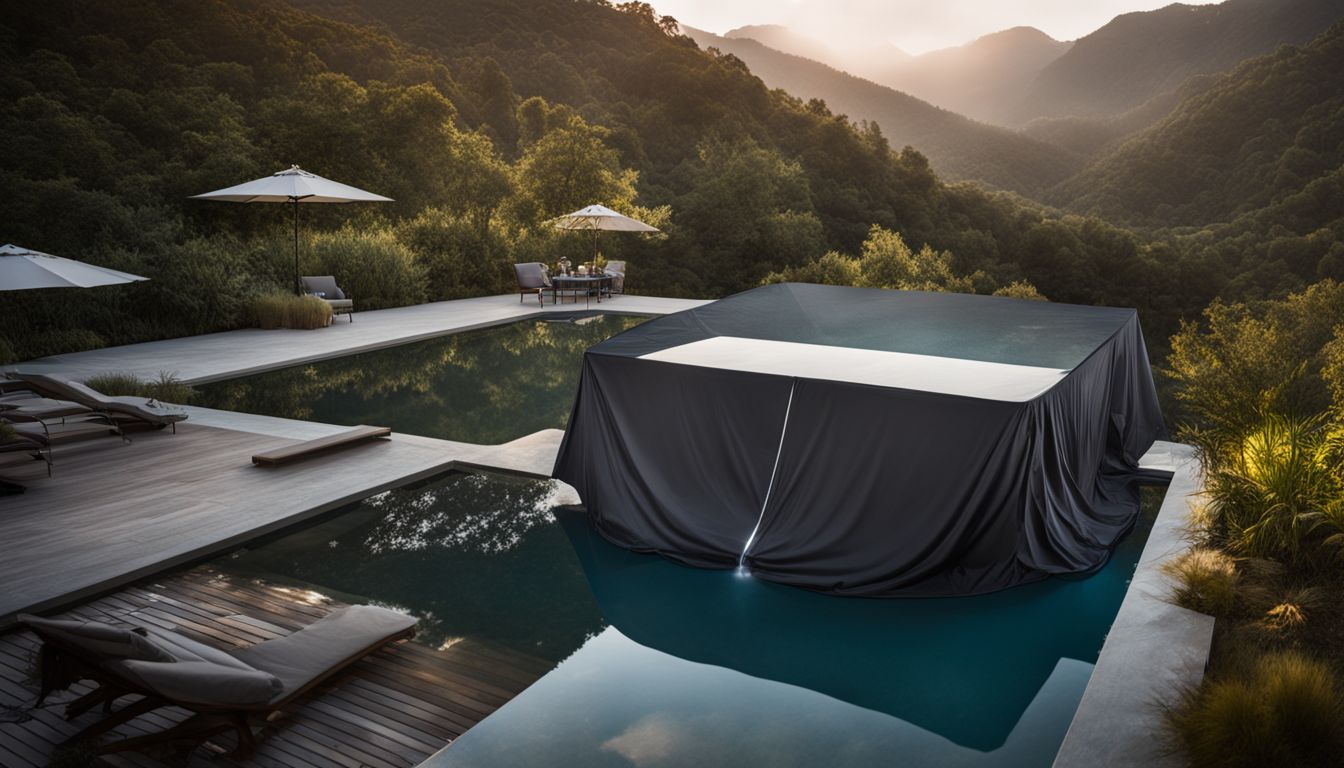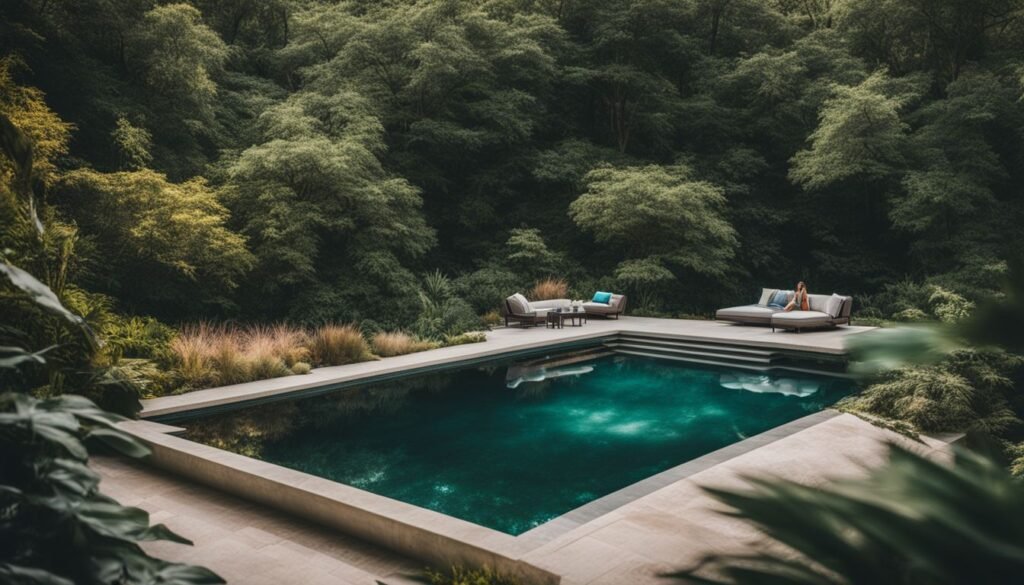Deciding whether to leave your pool cover off overnight can be a tricky dilemma. Interestingly, using a pool cover can significantly reduce water evaporation. This article aims to explore the ins and outs of pool cover usage—highlighting the benefits of keeping it on or taking it off at different times.
Read on for some enlightening insights.
Key Takeaways
- Pool covers reduce water evaporation and save heating costs by keeping the temperature stable.
- Leaving a pool cover off at night can balance the water’s heat, especially after sun exposure during the day.
- Not using a cover every night helps avoid algae growth and chemical imbalance in the pool.
- Daily removal of the pool cover prolongs its life and ensures even temperatures and better pH balance in the water.
- Always consider your specific situation, like climate and pool type, when deciding to leave your pool cover on or off overnight.
The Pros and Cons of Leaving Pool Cover On Overnight

Exploring the decision to leave a pool cover on overnight reveals a mix of benefits and limitations that require thoughtful consideration. Let’s delve into the intricacies of this choice through a detailed examination of its advantages and disadvantages.
| Pros | Cons |
|---|---|
| Reduces evaporation significantly, conserving water and saving on refilling costs. | Accumulated moisture can be a breeding ground for algae if not properly managed. |
| Traps moisture that naturally goes back into the pool, keeping water levels stable. | Requires diligent use of a cover pump to prevent water accumulation on the cover’s surface. |
| Keeps debris away from the water, reducing cleaning time and maintaining water quality. | During warmer seasons, solid covers need removal during the day to prevent overheating the water. |
| Saves energy by maintaining the pool’s temperature, cutting down on heating costs. | Potential for increased chemical consumption to manage the water quality under the cover. |
Reflecting on these points reveals the importance of a balanced approach in managing pool covers. Each pool owner’s situation is unique, and the decision to leave a pool cover on overnight hinges on various factors, including climate, pool type, and personal preferences.
Benefits of Removing Pool Cover During the Day

Removing the pool cover during the day ensures even water temperatures. It helps prolong the life of your cover and maintain better pH balance.
Even Water Temperatures
Taking off your pool cover during the day aids in maintaining even water temperatures. Pool covers can increase the water temperature by up to 5°C, which is great for keeping the pool warm.
However, this might not always be what you want, especially in high summer. Without a cover, the sun evenly warms the pool throughout the day. At night, leaving the cover off allows cooler air to help balance out any excessive warmth from daytime heating.
This natural cooling ensures your pool isn’t too hot for a refreshing swim.
Pool heating and cooling depend on a delicate balance—covering at night traps heat, while uncovering during daylight offers it a chance to dissipate if needed. This approach of managing your pool’s temperature doesn’t just keep swimmers comfortable; it also helps maintain optimal conditions for water chemistry balance.
By allowing your pool to breathe, so to speak, you’re ensuring that everything from pH levels to chemical stability remains in check—a win-win situation all around!
Prolong The Life of Your Cover
Giving your pool cover a break, especially during the day, has its perks. For one, proper cover maintenance like airing it out once a week lets trapped carbon dioxide escape. This simple act alone can significantly prolong the lifespan of your cover.
Think about bubble covers; they’re not made to last forever but treating them right by ensuring correct care and regular ventilation can push their durability from 50% to an impressive 125% longer than expected.
Cover removal isn’t just about cleaning or drying; it’s essential for maximising the cover’s lifespan too. By letting your pool breathe, you essentially invest in prolonging your cover’s longevity without any extra cost.
It becomes a win-win – you get even water temperatures and better pH balance while also giving your pool cover the gentle treatment it needs to serve you longer.
Better Balance In pH Levels
Taking off the pool cover during daylight hours helps maintain a stable pH balance. Sunlight interacts with the water chemistry, naturally moderating pH levels. This process is crucial for preventing too much acidity or alkalinity in your pool, which can harm swimmers and degrade your pool’s infrastructure over time.
Exposing your pool to the sun also keeps chlorine levels in check. Chlorine works more efficiently under direct sunlight, keeping the water clean and safe for everyone to enjoy. Remember, a well-maintained pH balance means less work on pool maintenance and more time for fun swims!
Understanding the Functionality of Pool Covers
Pool covers serve multiple, crucial roles to keep your swimming oasis in top-notch condition. They ramp up heat retention by a striking 75%, making chilly mornings no deterrent for a relaxing swim.
Imagine diving into warm waters, heated naturally under the cosy embrace of a solar cover – it’s energy-efficient and eases the burden on your heater.
These versatile covers also act as vigilant guards against unwanted debris, leaves, and dirt. This defence cuts down on cleaning time and keeps maintenance headaches at bay. Plus, they’re champions at preventing evaporation – every drop saved is a victory in water conservation and cost savings.
And let’s not overlook their prowess in trapping moisture back into the pool; this sneaky move ensures your water levels stay steady without constant refills. Whether you’re prepping for winter or aiming to nip algae problems in the bud, laying out that pool cover can make all the difference.
When to Use a Pool Cover
Covering your pool is crucial whenever it’s not in use. This simple step can significantly maintain water temperature, especially if you’re heating the pool. Use a transparent or bubble cover during daylight hours to cut down on evaporation.
It’s also essential for preserving chemicals in the water, making sure they don’t vanish into thin air overnight.
Remember, do not leave a cover on for more than seven days straight to avoid chemical build-up. After adding high doses of chlorine or doing a shock treatment, take the cover off to prevent any damage.
Keeping dirt and debris out with a pool cover means less cleaning and maintenance, saving you time and effort. Always think about protection from UV rays while keeping energy costs down; using a cover helps with both.
Conclusion
Deciding to leave your pool cover off overnight really comes down to personal choice and specific conditions. If you’re after warmth and are keen to reduce evaporation, keeping that cover on might be your best bet.
On the flip side, taking it off can prevent chemicals from building up and give you a head start in warming your pool with some natural sunlight come morning. Remember, it’s all about finding what works for you and keeps your swimming experience just right.
FAQs
1. Is it harmful to leave the pool cover off overnight?
Leaving the pool cover off overnight can lead to heat loss, increased water evaporation, and potential debris accumulation.
2. Should I leave my pool cover on or off during the night?
It’s advisable to keep your pool cover on during the night to maintain water temperature and minimise debris entry.
3. How does leaving the pool cover off at night affect water quality?
Leaving the pool cover off at night can result in increased exposure to environmental elements, potentially impacting water cleanliness and chemical balance.
4. Can leaving the pool uncovered overnight impact energy costs?
Leaving the pool uncovered at night may increase energy usage as additional heating may be required due to heat loss from evaporating water.
5. What are potential risks of not covering the pool overnight?
Not covering your pool at night could lead to temperature fluctuations, increased maintenance needs, and higher operating costs for filtration and chemicals.




